These notes will serve as part of a briefing document that I will send off…
French presidential election – some hope for a future progressive, anti-EU Left
Australia will go to a federal election on May 21, 2022 with the current conservative government looking in bad shape and the Opposition Labor Party has been helped a little by interventions from the French president. Emmanuel Macron candidly called the Australian Prime Minister a liar which further dented his already fractured image as the most untruthful politician in Australia. I hope the conservatives are routed but, in saying that, I know it means the Labor Party will take power and continue their embarrassing pretence to be progressive, while preaching the very mainstream economics that has damaged so many of the people that the Labor politicians claim to represent. A bad situation really. We are not yet in a situation where the traditional conservative and labour parties are being challenged by new entrants to the field. The first round of the French presidential election for 2022 were held at the weekend with some very interesting results and definitely showed that the traditional political voices in France are dead – something we could only wish for in this country.
Imagine an election where the traditional conservative party – Les Républicains – received less than 5 per cent of the vote and the traditional Left party – the Socialist party – could not even get 2 per cent of the vote.
In the – 2017 French presidential election – Les Républicains gained 20 per cent of the vote (with François Fillon as the candidate) and the Socialist Party gained 6.4 per cent (with Benoît Hamon as the candidate).
The following table shows the percentage votes in the first-round by candidate and party leaning.
The far right voice gained 31 per cent of the vote, which is telling. Zemmour did not run in the 2017 election, so his vote capture represents a growing far right voice in French politics and will make it interesting in the second round.
The next graph shows the per cent vote in 2022 (bars) against the 2017 results (vertical line) for the first-round presidential voting.
Where there is no vertical line – there was no applicable 2017 result. For example, Éric Zemmour was a new force in 2022.
You can find the official results from the Ministère de l’Intérieur – Election présidentielle 2022 – site.
The 2017 first-round attracted 77.8 per cent of eligible voters, whereas the turnout in 2022 was 74.86 per cent.
That amounts to around 1,390,970 less voters voting in 2022 compared to 2017.
There have been substantial changes in preferences since the Russian invasion.
Polico.eu poll of polls for – France – 2022 presidential election – produced this excellent graphic – visit their site if you want a larger version with some alternative viewing options.
Since the Russian invasion, Marine Le Pen and Jean-Luc Mélenchon have made very significant gains.
– Le Pen from 17 per cent according to the polls at the time, to 24 per cent in the actual vote.
– Mélenchon from 12 per cent according to the polls at the time, to 21.6 per cent in the actual vote.
Zemmour’s vote fell from 14 per cent intended at the time of the Russian invasion to 7 per cent in the actual vote, probably as voters moved towards the more moderate but still far right Le Pen.
The decline of the Valérie Pécresse representing the traditional ruling – Les Républicains – from 15 per cent at the time of the Invasion to 4.7 per cent indicates a spectacular decline in traditional voting patterns.
Further, the Socialists have been in the doldrums for a long time and showed no recovery under the candidature of the Mayor of Paris, Anne Hidalgo.
The graph that really starts to tell a story (apart from the map) is the next one, which shows the breakdown of the vote by age.
And here is the voting map for the first round.
The map is from – France24 – and shows the spatial divide in France.
Marine Le Pen dominates the north and north-east, while Emmanuel Macron is the most popular elsewhere (west and south-east and south).
Jean-Luc Mélenchon enjoyed strong support in the northern suburbs of Paris and is several regional centres.
I am still analysing the results but here are some observations from a long way from France (although Australia isn’t far from New Caledonia!):
1. Emmanuel Macron won the first-round on the back of the over-65 year old but his once unassailable lead over Marine Le Pen is gone and the second-round on April 10, 2022 has become more interesting.
2. This vote revealed the on-going but large shift in French politics (from my understanding). The traditional dominant parties – Les Républicains and the Parti socialiste – are in a death spiral.
Both, in various ways have failed to provide a voice for the times and have become corrupt, complacent parties of the establishment (right and left).
They have been in decline since it became obvious that the adoption of the common currency and the dysfunction of the European Commission and its bullying policies have left a generation disenfranchised.
I traced this shift in my book – Eurozone Dystopia: Groupthink and Denial on a Grand Scale (published May 2015) and we analysed it further in – Reclaiming the State: A Progressive Vision of Sovereignty for a Post-Neoliberal World (Pluto Books, September 2017).
The traditional parties represent the ruling class in France.
The people have rejected them.
Good.
3. Marine Le Pen was the most popular among the prime-age voters – 35 years to 64 years, and given her heartland is the industrial north and the south.
She has reinvented the Far Right to some extent but remains Far Right ceding the mad fringe to Éric Zemmour.
The problem for her now is that she is unlikely to be successful in the second round as a result of the operation of the so-called – Cordon Sanitaire – which refers to a refusal of the voting population to embrace an extremist viewpoint.
In the context of French politics, that refusal has traditional cost Marine Le Pen’s group the chance of major success.
The other aspect of this refusal is that Jean-Luc Mélenchon, who is now the voice of the Left in France, gained 7,605,225 votes (nearly 22 per cent).
At the press conference following the vote, the spokesperson for the Party Alexis Corbière said (Source):
… il est clair qu’à aucun moment le choix du Front national n’est posé … Il s’agit de notre ADN politique. Pas une voix ne doit aller pour le Front national, pas une.
(It is clear that there has been no choice made for the National Front. This is our political DNA. Not a single vote should go for the National Front, not one).
Which makes it easier for Macron, unless most of the Left abstain from voting.
Then Zemmour’s vote becomes a threat to Macron and he has pledged support for Marine Le Pen in the second-round.
4. The demise of the traditional parties has seen a new dichotomy emerge – pro-EU-euro Macron versus the anti-EU-nationalist Le Pen.
In fact, the anti-EU vote also embraces Jean-Luc Mélenchon, Nicoloas Dupont-Aignand and Éric Zemmour among others.
There are now more voters who are sympathetic to their position on Europe than there are strong voices for Europe.
5. Jean-Luc Mélenchon, who is now clearly the dominant voice on the Left, attracted spectacular support from the youth and 25-34 year olds in France, which I take as a really good sign.
Macron’s power base will die off soon enough and the fact that the younger voters are attracted to the Left agenda should provide a lot of hope for progressives in France and beyond.
He is also caught between a rock and a hard-place in advising his support base on what to do in the second-round run-off because he also doesn’t want to endorse the centre-right Macron.
It is too hard to know how his votes will distribute among Macron and Le Pen or be lost through abstention although the opinion polls are predicting 53 per cent will go to Macron.
But in the French press, I have read that around 50 per cent will abstain, which still leaves a huge number of voters who could swing between Macron and Le Pen.
Probably, the fact that Jean-Luc Mélenchon is out is an advantage to Macron given the ‘cordon sanitaire’. If he had to face off against the Left candidate, things might have been very interesting because more of Le Pen’s votes would have leaked to Jean-Luc Mélenchon than the other way.
The good thing from the poll is that the Far Right loony candidate Zemmour failed after previously being seen as a contender.
There is some maturity in the French electorate.
Conclusion
I guess Macron will win on April 10.
But what interested me the most was that Jean-Luc Mélenchon captured the votes of the younger French voters and the youngest cohort – the 18-24 year olds – rejected Le Pen and Zemmour.
If that trend continues, and as time passes with those age cohorts getting older, there might be a future for a progressive, anti-EU Left in France.
That is something to be cheerful about despite the likelihood of a Macron victory overall in 2022.
That is enough for today!
(c) Copyright 2022 William Mitchell. All Rights Reserved.
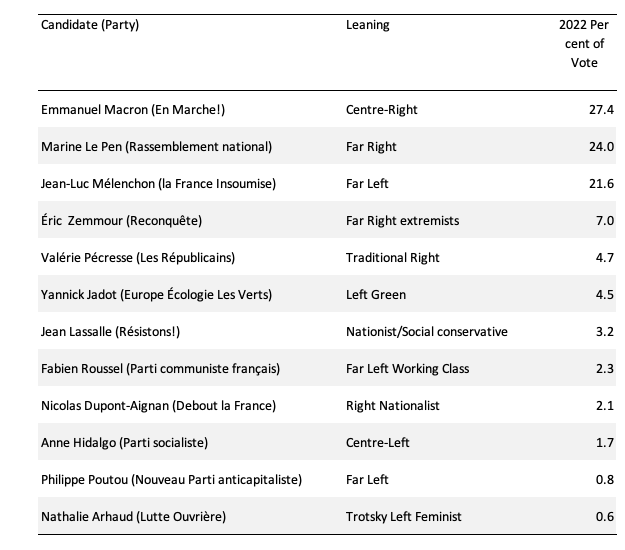
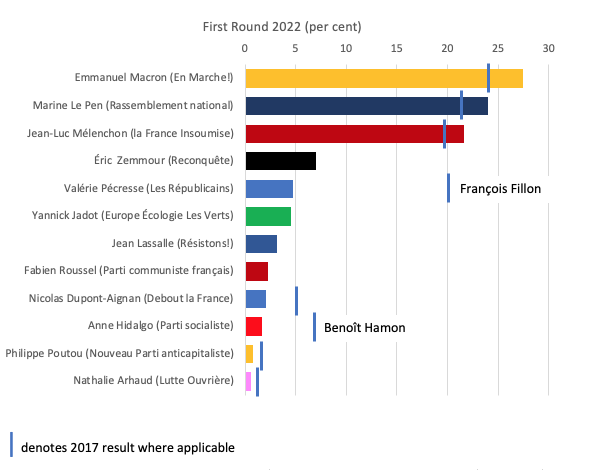
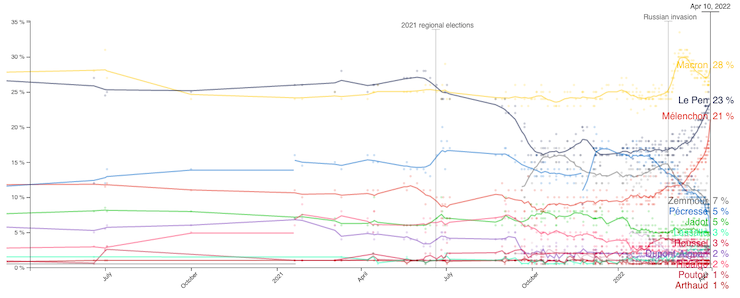
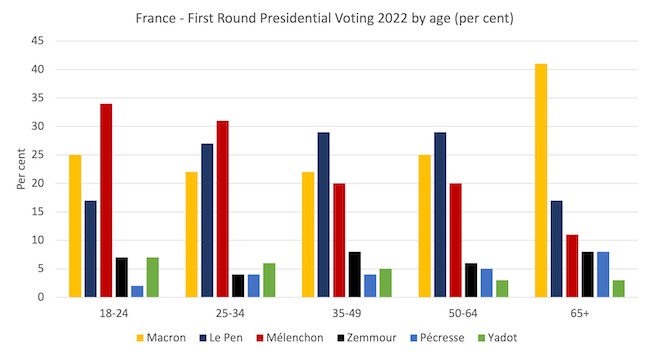
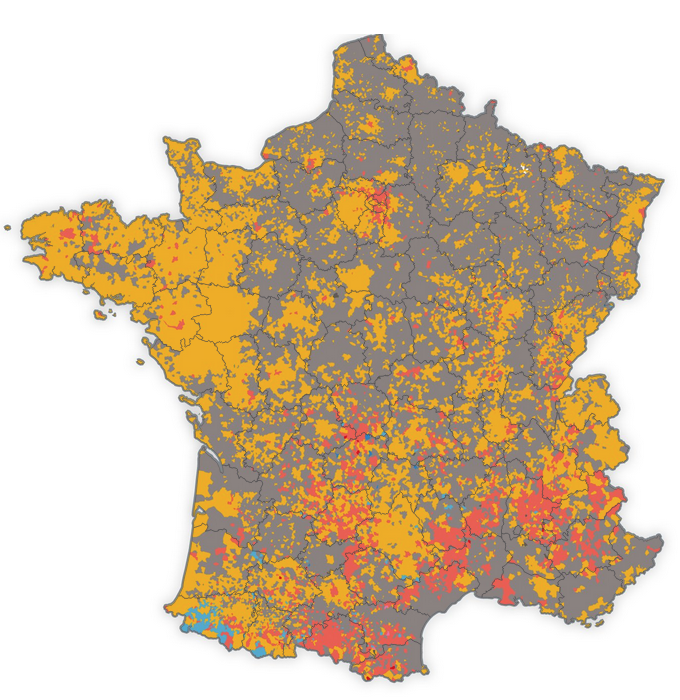
Progressive, anti-EU Left in France. They certainly need that!
Another thing that will rapidly change Europe ! The Europeans have shot themselves in the foot on energy and their real enemy is not the Russians but the US who have carefully orchestrated the outcome in Ukraine with their neocon neoliberal masters!
“The traditional parties represent the ruling class in France.”
Exactly the same point could be made about the traditional parties in the UK.
Chris Williamson needs to launch FEP, the Full Employmnet Party.
A Full Employment party sounds rather too much like a single issue campaign, and loses traction in current circumstances in the U.K., which is actually experiencing labour shortages due variously to fewer immigrant workers thanks to Brexit and pandemic-induced return to home countries, plus the general toll of Covid and Long Covid on the remaining workforce, which is reducing in size as disability and burnout grow. Even graduate vacancies exceeded actual graduates in 2020, which not normal.
It would have been preferable for a leftist resurgence to have recaptured Labour from the Blairites, as opposed to forming a new party, as the brand recognition is so strong, but that boat has probably now sailed, so something else is needed.
The rump still left in the Labour Party dropped their principles in a second last month when Starmer threatened them with expulsion for supporting Stop the War, so not much hope to be expected now from that quarter of cowards.
Probably a new cast of left wing candidates is needed, as much as a new party. (Much as I personally like and respect Chris Williamson, I cannot really see him achieving anything like broad popularity). The question is, who would these new left wing candidates be, where would they come from – and, having witnessed the treatment meted out to Jeremy Corbyn, would the establishment ever permit them to get anywhere?
Re: France; how dumb of the Communists, Greens and Socialists not to lend all their support to Melenchon. Neither a Macron nor a Le Pen victory enthuse.
Sorry, I realise my posts reads as something of a counsel of despair, but I fear that is where I am, given the circumstances.
The crisis consists in the old order refusing to die, and the new not yet being born, etc, … but it could be a very long gestation.
Maybe the unhappy new schism between west and east will be the catalytic midwife that’s needed, but the progeny might be even worse than what we have already, and the gods may yet punish us by giving us what we want.
Meanwhile, Martin Lewis, the popular U.K. money adviser, is warning of upcoming social unrest from steep and sudden cost of living increases, but I’m not so sure – knowing the British population, I think it’s more likely to just lead to an increase in crime, and the incidence of self-harm. It is truly depressing.
Polling shows 8/10 of Jean-Luc Mélenchon voters will note vote in the 2nd round.
2/10 will vote for Le Pen rather than Macron.
Only a sideshow anyway. We’ve seen it all before with Bernie and Corbyn. The French media can destroy the left in France any time of their choosing. Like they did in the US and UK.
They’ll be working 24/7 seven days a week to stop Le Pen winning the second round. The majority simply don’t want an alternative point of view. If their TV’s and Radios told them the moon was made out of cheese they would believe it.
Any alternative point of view will be censored/ cancelled/ banned by the tech giants.
If 36 media channels were all saying exactly the same thing at exactly the same time they will believe it. Not even question why all 36 are singing off the exact same song sheet. Not even register that when that happens the media has been totally captured by vested interests.
I fully expect Le Pen to be labelled antisemitic over the next few days. If Macron loses Russia will get the blame. Which is quite extraordinary really as when they actually do find Nazis in Ukraine they deny they exist. Voters are potty trained to call them moderates like moderate jihadists in Syria who just loved chopping people’s heads off.
Another curious outcome of these elections is the demise of the so called green parties.
When people realize that “green” is just a label and that they will end up with just another bunch of oportunists, they will reject it like they rejected the failed traditional parties.
People reject those who say: look at us, we’ve been in power many times, so we are fit to rule.
But then, you find yourself in a dystopian union and you say: you failed!
And you say: I prefer something new.
If the new becomes old, than they are cast away just like the traditional parties.
@MrShigemitsu
“A Full Employment party sounds rather too much like a single issue campaign…”
It could be said that the most successful British party in recent times was the Brexit party. They never had an MP but they achieved their objective of extracting the UK from Europe.
It is for that reason I would choose a single issue party. It would force Labour and the Tories to explain why they could not support an JGS and bring important matters to the fore in British poliitics about the power of a currency creating state.
A more general political party would be doomed to failure however desirable it might be. Williamson would be unwise to form such a general party.
“It could be said that the most successful British party in recent times was the Brexit party. They never had an MP but they achieved their objective of extracting the UK from Europe.”
A very fair point, and I can see the value in it.
UKIP and The Brexit Party certainly scared the Tories into promising, and ultimately holding and abiding by the result of, the referendum that they’d campaigned for, as a way of scooping up UKIP/BP voters – so it’s possible that a threat from a small left-wing party with a powerful and popular message could achieve similar leverage by potentially stealing votes from a Starmerite Labour party – and I have also argued this concept myself.
I wonder if Full Employment is enough of a lever though, given that post-Brexit and as a result of continuing Covid there is a tighter labour market already?
And, being utterly cynical and pessimistic now, I also wonder whether Starmer’s Labour Party even *wants* to win a General Election – the main thrust of the project having been to keep out any trace of socialism from UK politics, and that mission having been accomplished, regardless of who wins the next UK GE?
Where the anti-mask, anti-vaxx and anti Covid pass votes that went to the right will go in the second round.
What a crap voting system in France. A run-off choice between crap and crappier as always. Presidential voting systems are inherently inferior to voting systems where the nation’s leadership is determined by who can form a majority in parliament as any vote for 3rd parties or 4th parties and smaller are discarded even when in total the minor parties could carry a large share of the primary vote.
Germany’s (and NZ’s) mixed member proportional voting system is far more democratic as it allows smaller parties to have representatives elected to parliament in an equitable ratio – in proportion to their primary vote, and allows smaller parties to become established and form part of ruling coalition governments.
The problem of having an establishment controlled mass media and partisan ‘expert’ commentariat that totally blots out any ‘truth’ in politics however still applies in Germany and nearly everywhere else.
I’m still a LP member – just – because I’m no longer a CLP secretary (high profile). I was suspended when I was and current one has just been suspended – like so many others a jew accused of antisemitism. But I’m very conscious that those 1000s who have been expelled/driven out, need a new left party. We should have a discussion about the name and focus to attract voters, like UKIP did. MMTers can help with this.
Sad news from France. Alain Parguez died a few days ago. A titan of Circuitism, pretty much the continental variant of MMT. Many of his works are essential reading, with concise insights not easy to find elsewhere.